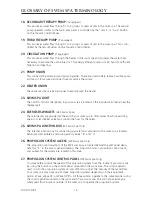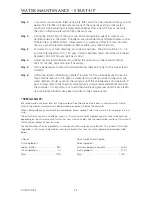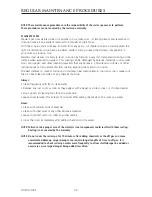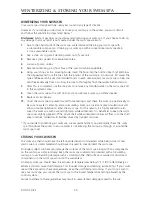
30
DO NOT DIVE.
104
DO NOT DIVE.
REGULAR MAINTENANCE PROCEDURES
NOTE: These maintenance procedures are the responsibility of the swim spa owner to perform.
These procedures are not covered by the swim spa warranty.
STAINLESS STEEL
Master Spas uses stainless steel in a number of our swim spas. Its lasting beauty and resistance to
corrosion make it an excellent material for handrails and jets faces.
With the proper care it will keep its luster for many years. All stainless steel can corrode given the
right circumstances so we have provided a guide to help you keep the stainless components in
your swim spa looking nice.
Stainless steel derives its ability to resist corrosion by forming a very thin transparent coating on the
surface when exposed to oxygen. This coating can be damaged by abrasive materials such as steel
wool, sand paper, and other cleaning materials that are abrasive. Chlorine salts, sulfides, or other
rusting metals can also erode this thin coating exposing the metal to corrosion.
The best defense to combat corrosion on stainless steel components in your swim spa is make sure
that it is kept clean and free of any chemical build up.
Always:
• Clean frequently with fresh, clean water.
• Remove any rust spots as soon as they appear with vinegar or a brass, silver, or chrome cleaner.
• Use a good car cleaning wax for extra protection.
• Leave cover removed for at least 15 minutes after adding chemicals to the swim spa water.
Never:
• Clean with mineral acids or bleaches.
• Clean with steel wool or any other abrasive material.
• Leave in contact with iron, steel any other metals.
• Close the cover immediately after adding chemicals to the water.
NOTE: Failure to take proper care of the stainless steel components could result with them rusting.
Rusting is not covered by the warranty.
NOTE: Do not cover the swim spa for 15 minutes after adding chemicals as the off gas can cause
unwarranted damage. Larger dosages can require longer lengths of time to off gas. It is
recommended to check swim spa water more frequently to allow small dosages be added as
necessary versus large dosages being added less often.












































